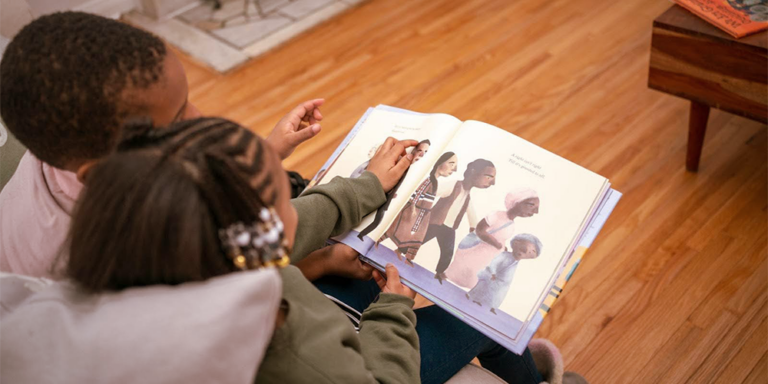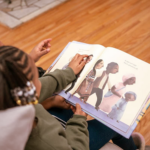With some students, it seems impossible to expose them to enough reading material to build their vocabulary and other literacy skills. They may not be proficient readers or simply don’t enjoy reading, and especially for students from lower income households, they may have a significant “vocabulary gap” compared to their peers from higher income households.
So how can teachers provide effective, equitable opportunities to build their students’ literacy skills? A recent study from the University of Missouri found that audiobooks might be a great way to do just that.
How Students Benefit from Audiobooks
So how exactly can audiobooks increase literacy skills? We Are Teachers points out the following benefits:
- Increases exposure to new language: Often, building vocabulary simply comes down to exposure. Audiobooks are an effortless way for students to hear new words used in context. You’ll be amazed how quickly they pick up the meaning of even complex words when they’re swept up in a good story.
- Develops a body of knowledge: When students struggle to read, they miss out on exposure to background knowledge your more proficient readers take for granted. Audiobooks help students of all reading levels engage with complex topics, thus giving them a broader body of knowledge they can bring to class discussions and future assignments.
- Improves working memory: Reading requires students to call on several different skills at once. For experienced readers, these skills quickly become invisible, but for struggling readers, it can be stressful to simultaneously focus on word decoding, understanding content, etc. Audiobooks help students exercise their working memory, which will in turn help them handle all the skills that go into traditional reading.
- Enhances comprehension: Learning vocabulary and decoding words is only half the battle when it comes to reading. The real end goal is comprehension! Audiobooks allow students to practice comprehension skills even before they master the mechanics of traditional reading.
- Encourages academic independence: Reading is part of nearly every school assignment, and that can be very discouraging for struggling readers. It’s not hard to understand how students can start to disengage from school as a whole when they’re faced with such a barrier at every turn. Audiobooks allow students to access content regardless of their reading abilities, helping them to feel more successful and involved in school in general.
Where to Find Audiobooks for Your Classroom
Let’s face it: Audiobooks can be expensive. When you consider the time, talent, and production required to create a single audiobook, it’s easy to understand why. All the same, schools and teachers have a limited budget, even for reading materials. So how can teachers bring all the advantages of audiobooks to their classrooms?
Here are some places to find audiobooks for free or cheap, from What I Have Learned Teaching:
Your Local Library (Free)
Your local library might surprise you with the breadth of their audiobook collection. Here are some tips for getting the most out of this free resource:
- Request books: Often, libraries have a monthly budget to purchase new books, and they allow patrons to request the books they’d like the library to buy. So if you have a little bit of lead time, make sure to request the audiobook you want, and who knows? It might be available for free in a couple of weeks!
- Register with more than one library: Every library has a unique catalog, so if you’re able to, see if you can join more than one local library to take advantage of multiple collections.
- Use the Chrome Library Extension: When you download the Library Extension, it will tell you whether a book you’re looking at on Amazon is available at your local library!
- Use library apps: Libby, Overdrive, and Hoopla all help you easily browse and download your local library’s audiobook files. If you’re a member of more than one library, you can easily flip between profiles.
- Have your students get library cards: If you can arrange it, take your students to the local library or see if they can apply for their own card from the comfort of your classroom. That way, they can access and download audiobooks for their personal use.
Public Domain Books (Free)
LibriVox, Open Culture, and Lit2Go all curate e-book and audiobook versions of books whose copyright has expired (in other words, they’re free!). The audiobooks might not have the best production value or the most engaging narrators, but they’ll certainly get the job done!
Audiobook Recordings (Free)
With a little bit of search engine wizardry, you can find audiobook recordings for free on Spotify and YouTube. If you’re looking for fall or Halloween-related books, check out this list of 53 books read aloud on YouTube.
Podcasts (Free)
It’s no secret that podcasts have exploded over the last few years. Story-based podcasts are no exception! What I Have Learned Teaching shares some of her favorites here:
- Storynory
- The Past & the Curious
- The Alien Adventures of Finn Caspian
- But Why
- The Two Princes
- Storytime
- What If World
- Stories Podcast
- The Unexplained Disappearance of Mars Patel
- Epic (free for teachers)
Amazon (Paid)
Amazon boasts one of the world’s most robust catalog of audiobooks. If you’re looking for a certain audiobook, chances are you’ll find it here.
If you plan to be a frequent book-buyer, you might benefit from their subscription services, Audible and Kindle Unlimited. Audible focuses specifically on audiobooks, and while Kindle Unlimited focuses primarily on e-books, these e-books sometimes also include narration so students can read and listen to the text at the same time.
The subscription services often offer a free or discounted trial, but if you’re just interested in sales or discounts on individual titles, check out Read Aloud Revival. This site curates news about Audible deals so you can get the best bang for your buck.
Learning Ally (Paid)
According to What I Have Learned Teaching: “Learning Ally is specifically designed to help struggling learners to access books. Most of the books are a paired e-book with narration. It highlights the sentences as the text is read aloud. It also has a vast selection of books, including many textbooks.”






